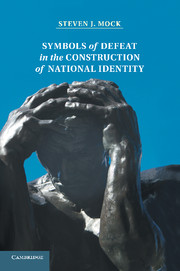Book contents
- Frontmatter
- Contents
- Acknowledgments
- Introduction
- 1 Theories of Nations and Nationalism
- 2 Totem Sacrifice and National Identity
- 3 Symbols of Defeat in National Monument and Ritual
- 4 The Defeat Narrative in National Myth and Symbol
- 5 Implications to Politics and Diplomacy
- 6 Exceptions
- Conclusions
- Bibliography
- Index
1 - Theories of Nations and Nationalism
Published online by Cambridge University Press: 05 January 2012
- Frontmatter
- Contents
- Acknowledgments
- Introduction
- 1 Theories of Nations and Nationalism
- 2 Totem Sacrifice and National Identity
- 3 Symbols of Defeat in National Monument and Ritual
- 4 The Defeat Narrative in National Myth and Symbol
- 5 Implications to Politics and Diplomacy
- 6 Exceptions
- Conclusions
- Bibliography
- Index
Summary
Modernism and Ernest Gellner
The earliest paradigm for understanding the nature of nations and nationalism is that of nationalism itself. Nationalist ideology typically represents the nation as, if not a natural, enduring, primordial entity, then at least an inevitable product of historical forces. At least in its “organic” form, nationalism is characterized by the following assumptions:
that the world consists of natural nations and has always done so,
that nations are the bedrock of history and the chief actors in the historical drama,
that nations and their characters are organisms that can easily be ascertained by their cultural differentiae;
however, members of nations may, and frequently have, lost their national self-consciousness along with their independence,
and, therefore, that the duty of nationalists is to restore that self-consciousness and independence to the “reawakened” nation.
These assumptions are evident in the genre of national histories that began to develop in the 19th century, carrying through to postcolonial literature into the present day; one that endeavored to trace the trajectory of “the nation” as a continuous protagonist across epochs of global civilization. However, they had already come under critical scrutiny by the beginning of the 20th century, when nationalism first developed as a distinct subject of academic inquiry. In the period between the First and Second World Wars, historians such as Hans Kohn, Carleton Hayes, Louis Snyder, Alfred Cobban, and E. H. Carr began to examine nationalism, as a mass movement for political unity or independence on behalf of a nation, as a phenomenon related to modernity. But it is important to note that it was nationalism as an ideology, rather than the nation as a construct, that was problematized in this manner. Even those historians who were hostile to the idea of nationalism nonetheless took it as given that it was a reflection of a preexisting reality such as the nation or nationality, even if it was only enabled by the instruments of mass mobilization modernity provides.
- Type
- Chapter
- Information
- Publisher: Cambridge University PressPrint publication year: 2011



